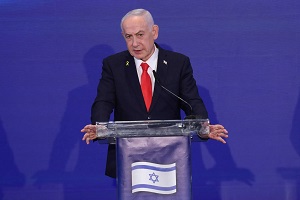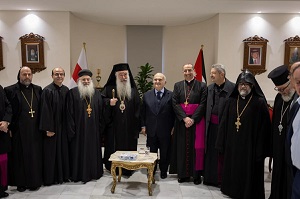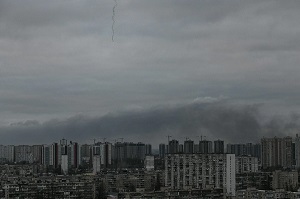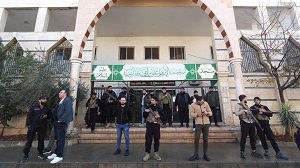How to put Iraq back again - By MOHAMMAD RASOUL KAILANI, Jordan News
Whenever it seems that Iraq is escaping the unyielding grip of war, clashes begin and the blood of innocent people continue to paint the Euphrates red.
Iraq’s wars with Iran and Kuwait were followed by sanctions that starved much of the population, but the real death blow came from America’s illegal invasion in 2003, when hundreds of thousands of civilians were raped, tortured, or murdered. America’s occupation destroyed Iraqi lives and destroyed the state. The occupiers irresponsibly dissolved all Iraq’s institutions, most importantly the army. All of a sudden, half a million well-trained and well-armed men found themselves unemployed, easy prey to sectarian extremist groups. Because of the disbandment, radicals filled the ranks of the Coalition’s new security forces.
The US was completely unfamiliar with Iraq’s culture and politics. Under the influence of lobbies and false intelligence, the occupiers allowed some of the most corrupt, reprehensible, and treasonous politicians to run the shattered state. These two factors combined to create Sunni-Shiite conflicts: one on the US watch in 2006, another, more notorious, that began with Daesh in 2013.
It is a well established fact that American policies gave way to sectarian war in Iraq. It is also likely that this was intentional. In 2015, former CIA officer Michael Scheuer had this to say in an interview with Channel 4: “Our best hope right now is to get the Sunnis and Shiites fighting each other and let them bleed each other white.”
While Scheur is no CIA spokesperson, it is clear that dividing Iraqis along sectarian lines, a relatively unimportant distinction before 2003, would benefit the occupation and weaken the resistance.
The murderous Al Qaeda, Mahdi Army, and Badr Brigade spent more time fighting each other and Iraqis caught in the crossfire than those who truly made their lives miserable.
Daesh has now been defeated, or almost so, but other problems left by the invasion still plague Iraq. A corrupt political class managed to climb to power, and so did foreign countries, principally Iran. Now, thousands of militiamen known as the Popular Mobilization Front indirectly answer to Iran’s Ayatollah Khamenei.
When the Iraqi people protested in 2018 for a new system, more rights, and the departure of these armed mercenaries, they were gunned down in the streets. Today, it is not Iraqis fighting foreign armies, nor Sunnis and Shiites in conflict, but Shiites fighting other Shiites.
After an electoral dispute between popular cleric Muqtada Sadr and pro-Iran parties, Sadr “resigned from politics” (he has done this before), leading his supporters to fight Iran-backed militias in the middle of Baghdad.
The US claimed it invaded Iraq to bring about democracy, but how could there be democracy when an entire country is armed to the teeth and the courts are as good as defunct.
Even if violence is taken out of the equation, Iraq is still in a sad state. The economy is import dependent in spite of the country’s wealth and resources. Electricity is not a guarantee, water is becoming scarce, and corruption is rampant.
To fix this, to truly rebuild the country, the root of the problem needs to be tackled; the foundations on which post-invasion Iraq has been built.
The US was completely unfamiliar with Iraq’s culture and politics. Under the influence of lobbies and false intelligence, the occupiers allowed some of the most corrupt, reprehensible, and treasonous politicians to run the shattered state.
The design of the 2005 constitution gave way to governments led by coalitions, which became the standard in Iraq. In order for coalitions to attract more members, political parties and certain sects/ethnic groups are bribed with the control of ministries. This means there is no unified plan or platform, and this leads to stagnation in many regards, and a severe lack of state services.
Lack of education and poverty, other ripple effects of 2003, have contributed to this situation before. In Iraq’s ever growing number of slums, becoming a militiaman is the only viable career prospect. These projects on the outskirts of cities are breeding grounds for indoctrination, as a rapidly increasing young population that did not have the opportunity to get educated and informed is courted by different militias to do their bidding.
Sadr, for example, has millions of Iraqis who would die for him, in spite of the fact that his militias have committed war crimes and he flip flops about twice a year. Politicians such as Sadr deliver services that the state consistently fails to provide, and use their ill-obtained funds to penetrate the institutions in the poor areas to cultivate a massive power base.
If the way ministries are run is reformed, there will be a decline in militias over time. Should ministers be chosen based on merit, the lives of ordinary Iraqis will improve, as will their trust in the state, making them less likely to run to external actors. To do so, there is need of a law stipulating the neutrality and competence of ministers. If that is not possible, having ministers that are members of one party would make more sense, because the ministries will be able to coordinate better.
However, there are rarely majorities in Iraq’s parliament because of the plethora of parties.
In order to resolve that issue, parties centered around figures and sects must be dissolved and a reform drive should create parties based on ideology. This move, unlike everything Bush and co did, can create a more democratic Iraq.
Militias, the biggest obstacle to Iraq’s development and democracy, are illegal by the country’s constitution, yet still run rampant in the country. The reason was the American reliance on these actors after the dissolution of the original army.
In conjunction with the socio-political reforms mentioned above, the Iraqi Armed Forces need to be rebuilt. More funding must go to regular units and recruitment, for the military to overwhelm the militias or, even before getting to that point, win over the militia’s target audience: poor, young Iraqis.
Reshaping the ministries will result in improved Iraqi economic performance, but international assistance is required for the military. The international community must undo what it has done, and contribute financially to build the Iraqi security forces to counter catastrophes like Daesh and Iranian militias in the future.
Over the last 20 years we came to realize that the stability of Iraq is imperative for the stability of the region; Mesopotamia, the birthplace of civilization and a wellspring of resources, can become a new hope for the Middle East if serious changes are made.
Mohammad Rasoul Kailani is a first year student at the University of Toronto. Amongst various other topics, his interests are in Middle Eastern affairs.
Latest News
-
 Netanyahu to Meet Trump in US on Monday for Talks on Iran, Gaza, Hezbollah, Syria
Netanyahu to Meet Trump in US on Monday for Talks on Iran, Gaza, Hezbollah, Syria
-
 JMD forecasts heavy rain, brisk winds, low visibility
JMD forecasts heavy rain, brisk winds, low visibility
-
 Prince Hassan congratulates Christians on Christmas
Prince Hassan congratulates Christians on Christmas
-
 Zelensky says Kyiv attack shows Russia does 'not want to end the war'
Zelensky says Kyiv attack shows Russia does 'not want to end the war'
-
 Same group behind Damascus church attack bombs Homs mosque
Same group behind Damascus church attack bombs Homs mosque